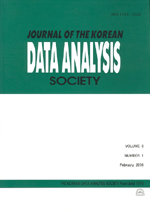내면아이상담을 활용한 부모교육프로그램이 부모-자녀 관계만족도와 부모효능감에 미치는 효과
Effects of an Parenting Education Program using Inner-Child Counseling on Satisfaction of Parent-Child Relationship and Parenting Efficacy for Parent
- 한국자료분석학회
- Journal of The Korean Data Analysis Society (JKDAS)
- Vol.17 No.5
-
2015.102719 - 2731 (13 pages)
- 150

본 연구는 청소년 자녀를 둔 부모를 대상으로 내면아이상담을 활용한 부모교육프로그램을 실시하여 부모-자녀 관계만족도와 부모효능감에 미치는 효과를 검증하기 위하여 실시되었다. 연구대상자는 G시에 위치한 중·고등학교 5곳에서 프로그램 참여를 희망하는 부모를 대상으로 하였다. 내면아이상담을 활용한 부모교육프로그램은 2014년 10월 20일부터 2014년 12월 20일까지 총 27명을 대상으로 매 주 1회기 90분으로 6회기를 진행하였다. 내면아이상담을 활용한 부모교육프로그램의 효과를 확인하기 위하여 실험군과 대조군의 부모-자녀 관계만족도 및 부모효능감의 차이를 공변량분석(ANCOVA)으로 분석하였다. 연구결과 내면아이상담을 활용한 부모교육프로그램에 참여한 실험군은 참여하지 않은 대조군에 비하여 부모-자녀 관계만족도(F=5.657, p=0.021) 및 부모효능감(F=4.410, p=0.041)이 통계적으로 유의하게 증가된 것으로 확인되었다. 청소년 자녀를 둔 부모를 위한 부모교육프로그램에 부모의 내면아이를 확인하고 돌볼 수 있는 구체적인 방법을 제시하는 내면아이상담을 활용하는 것은 부모 자신 뿐만 아니라 자녀인 청소년의 정신건강을 증진시킬 수 있는 효과적인 방법으로 사용될 수 있을 것으로 기대된다.
The purpose of this study was to evaluate effects of an parenting education program using inner-child counseling on satisfaction of parent-child relationship and parenting efficacy for parent. The participants were parents rearing with adolescents on 5 middle or high school in G city. The experimental group received the parenting education program using inner-child counseling, and the control group received the program after the experiment. Data were collected during October 20, 2014 and December 20, 2014 through self- administered questionnaires at two times: prior to the intervention and after the intervention. Data were analyzed using chi-square test, t-test and ANCOVA. After the intervention, parents in the experimental group reported significant differences in satisfaction of parent-child relationship (F=5.657, p=0.021), parenting efficacy (F=4.410, p=0.041), compared to the control group. These results indicate that an parenting education program using inner-child counseling for parents rearing with adolescents is effective in improving satisfaction of parent-child relationship and parenting efficacy.
1. 서론
2. 연구 방법
3. 연구 결과
4. 논의
5. 결론 및 제언
References
(0)
(0)